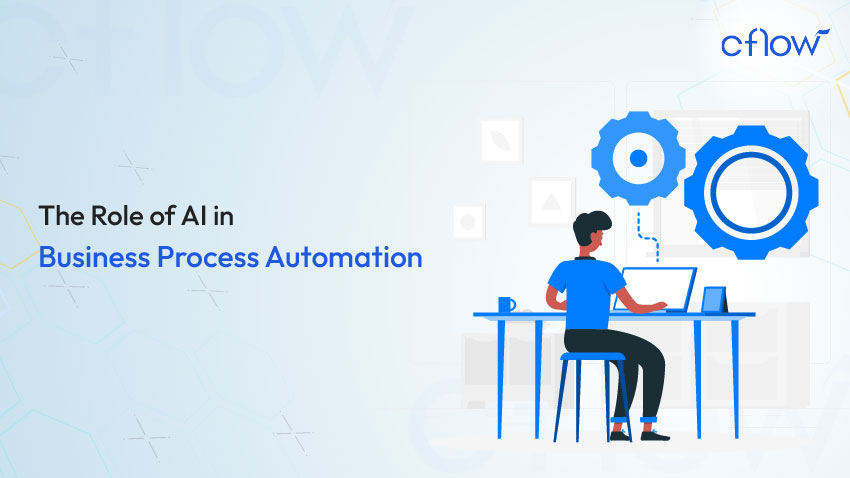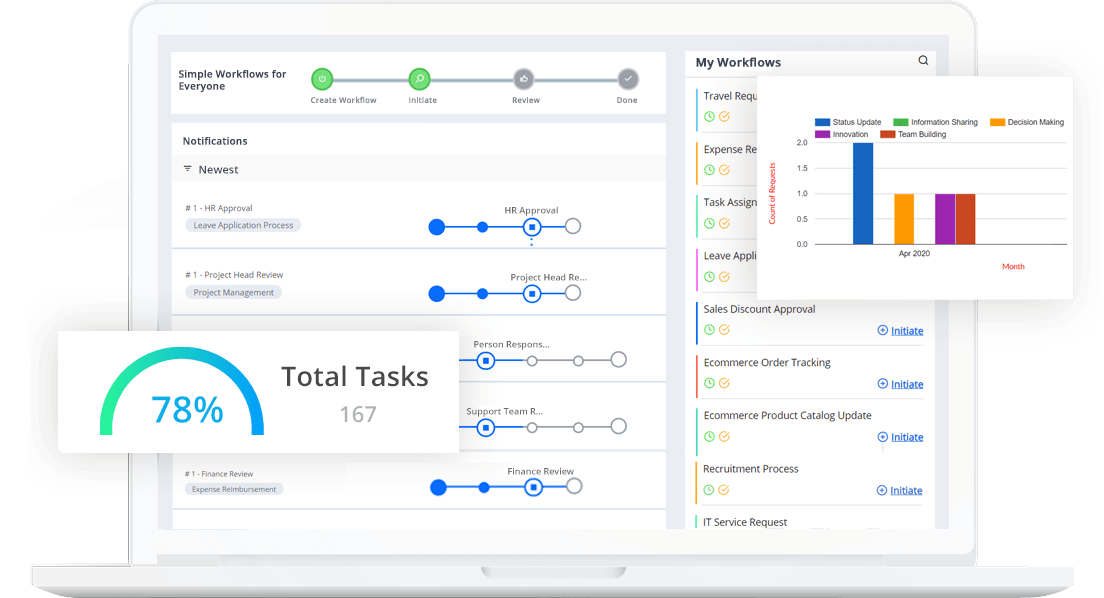The Role of AI in Business Process Automation

Business process automation (BPA) is a game-changer for many companies, streamlining process workflows and eliminating the dependency on valuable resources.
However, so far, it was limited to regular, routine tasks that followed a specific number of steps. Today, AI has penetrated nearly every aspect of business, revolutionizing it. Now when you integrate AI with BPA, the real magic happens.
Essentially, AI’s distinctive ability to think like humans differentiates it from traditional process automation solutions by offering real-time adaptability, independent decision-making, continuous learning, and vast data processing capabilities. These are features that traditional automation can never replicate.
That is, AI goes beyond simple automation; it transforms processes, allowing your business to process more intelligently, efficiently, and economically.
In this post, let’s explore how AI is revolutionizing BPA, making systems not only automated but genuinely adaptive. Whether you’re looking to enhance customer service, streamline logistics, or improve decision-making, AI has a role to play in making your operations more dynamic and efficient.
Core AI Technologies in Business Process Automation
Embracing AI to automate business processes is much more than just adopting a software application. It’s a complete digital transformation that brings together several key factors, all working in harmony to build smart, self-improving systems.
The three key tech components behind these systems are:
- Machine Learning (ML): ML algorithms are at the heart of AI’s predictive capabilities. They analyze historical data to identify patterns, predict future outcomes, and make data-driven decisions. This is especially useful in areas like demand forecasting and personalized customer experiences.
- Natural Language Processing (NLP): NLP is a technology that allows computers to understand, respond, and even manipulate human language in a way that feels natural. This technology is particularly critical in automating customer service interactions and processing large volumes of text-based data quickly and accurately.
- Robotic Process Automation (RPA): RPA handles repetitive tasks by mimicking human actions. When combined with AI, RPA transcends basic automation to perform complex processes such as interpreting applications, validating data, and making rule-based decisions without human intervention.
Understanding the nuances of these technologies will help you see how AI can fit into your automation strategy, enhancing the efficiency of your processes.
Benefits of AI in Business Process Automation
AI brings a multitude of benefits to the table. Together, these can completely transform your business ops for optimal performance.
Here are some of the benefits you acquire:
- Increased Efficiency and Productivity: AI automates not just simple tasks but also complex decision-making processes, significantly reducing the time employees spend on routine tasks, such as customer support and subscription management. This boost in productivity allows your team to focus on strategic initiatives that drive business growth.
- Improved Accuracy and Decision-Making: AI minimizes human errors by handling tasks such as data entry and analysis with precision. It also provides insightful analytics that support better business decisions based on real-time data.
- Enhanced Scalability and Flexibility: AI solutions easily scale with your business growth, handling increased workloads without the need for additional resources. This flexibility makes it easier to adapt to market changes and business expansions.
- Cost Reduction and ROI: By automating routine tasks, AI reduces labor costs and optimizes resource allocation. The initial investment in AI technology often pays off quickly due to these efficiencies, leading to a significant return on investment.
These perks prove that adopting AI to automate business processes is becoming a must for any modern business strategy. It can seriously boost both internal operational efficiency and also help keep customers happy—which we’ll discuss next.
Real-World Applications of AI in BPA
AI’s impact stretches across various industries, each harnessing its capabilities to solve unique challenges in day-to-day business processes.
Let’s take a look at a few real-world applications to better understand how AI is revamping processes across the board.
Customer Service Automation: Enhancing Responsiveness and Personalization
Companies like Telefonica have implemented AI to transform customer service. By using AI systems such as Amelia, they automate routine queries such as billing and technical support, significantly reducing the need for human intervention. This automation has led to faster response times, cost savings, and improved customer satisfaction rates. AI continues to learn and evolve, constantly improving its service capabilities.
Finance and Accounting: Streamlining Complex Processes
Firms like KPMG are leveraging AI to enhance financial audits in the finance sector. Using IBM Watson, they automate the analysis of contracts and financial documents to identify risks and ensure compliance more efficiently. This automation increases the accuracy of audits and reduces the time required to complete them, allowing firms to focus on higher-value tasks. AI can also automate complex financial tasks within companies, such as how to calculate payroll taxes, thereby reducing the time and potential for human error in payroll accounting.
Supply Chain and Logistics: Optimizing Efficiency and Accuracy
Logistics giants such as DHL utilize AI to optimize their supply chain operations. AI algorithms help in route optimization and demand forecasting, which minimizes delivery times and costs. Additionally, AI-driven automation in warehouses improves accuracy and speed in processing, leading to significant cost reductions and enhanced overall efficiency.
HR and Recruitment: Transforming Talent Acquisition
Companies like Unilever use AI-powered tools such as Harver and HireVue to automate their hiring processes. These tools assess candidates’ attributes and analyze video interviews to streamline the recruitment process, significantly reducing hiring times and improving the match between candidates and roles. This results in more effective recruitment and better alignment with company needs. Businesses are increasingly adopting AI recruiting software to enhance efficiency and improve hiring outcomes.
Marketing and Sales: Driving Targeted Customer Engagement
Coca-Cola employs AI to personalize marketing campaigns and optimize sales operations. By analyzing customer data, AI tailors marketing efforts to individual preferences, enhancing customer engagement and loyalty. AI also automates sales forecasting and inventory management, leading to more efficient operations and increased sales.
Healthcare: Advancing Patient Care through Automation
In healthcare, institutions like the Mayo Clinic implement AI to improve diagnostics and patient care. AI algorithms analyze medical images and patient data to provide more accurate diagnoses and personalized treatment plans. This enhances the quality of care and increases operational efficiency, allowing healthcare providers to focus more on patient interaction.
These examples highlight the transformative influence of AI in numerous industries, demonstrating its crucial role in fostering innovation and enhancing efficiency in business process automation.
Challenges and Considerations in AI-Driven Business Process Automation
While AI significantly enhances business process automation, it also presents several challenges that require careful consideration. Let’s examine the most significant ones and how they can be tackled.
- Implementation Costs: Initial setup and integration of AI technologies can be costly, especially for small to medium-sized enterprises. Businesses can start with pilot projects to manage costs and demonstrate ROI before scaling up, and look for modular AI solutions that can be incrementally implemented.
- Data Privacy and Security: AI processes vast amounts of data, so ensuring its privacy and security is crucial. Businesses must be in compliance with regulations like GDPR and CCPA. Adopting robust cybersecurity measures and ensuring compliance with international data protection regulations can also safeguard against breaches and misuse.
- Workforce Impact: Integrating AI can raise concerns about job displacement. It’s vital to manage this transition thoughtfully, providing training and reskilling opportunities to affected employees so that they can take on new roles.
- Ethical and Governance Issues: The use of AI must be governed by clear ethical guidelines to prevent biases and ensure transparency in decision-making processes. Establishing a transparent AI ethics framework and continuous monitoring of AI decisions for fairness and accountability can help address these concerns.
Addressing these challenges effectively is key to maximizing the benefits of AI in business process automation and ensuring sustainable and ethical integration into business operations.
Wrapping Up
By integrating AI, businesses are not only automating processes but are also making them smarter, more efficient, and more adaptable to ever-changing market demands.
Although challenges exist, the potential benefits far outweigh these obstacles, promising a not-so-distant future where AI-driven automation becomes a cornerstone of successful business operations.
Wish to start right away? Automate your core business processes with a workflow automation solution like Cflow.






